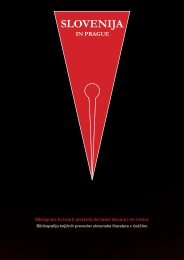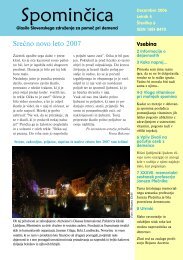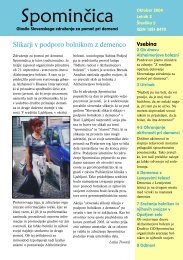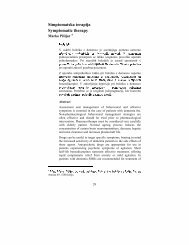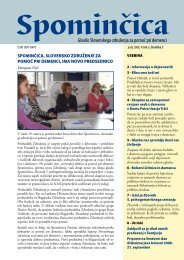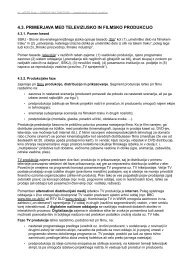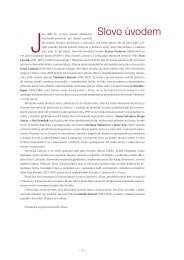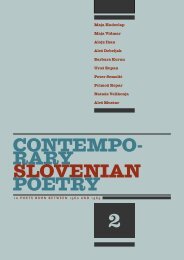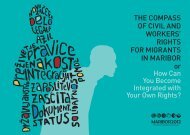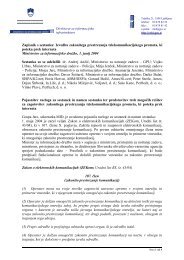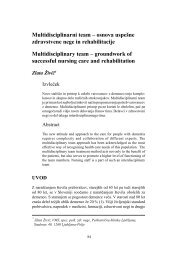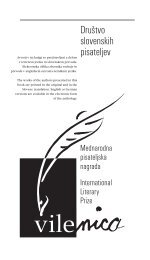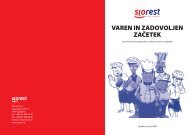Zbornik Mednarodnega literarnega srečanja Vilenica 2003 - Ljudmila
Zbornik Mednarodnega literarnega srečanja Vilenica 2003 - Ljudmila
Zbornik Mednarodnega literarnega srečanja Vilenica 2003 - Ljudmila
You also want an ePaper? Increase the reach of your titles
YUMPU automatically turns print PDFs into web optimized ePapers that Google loves.
Guilt<br />
/ short story /<br />
No one knew he was going on a trip. He had said nothing about what he had in mind.<br />
Tomorrow or the day after, those who loved and cared for him would ask, search and<br />
get no answer. And as the days would go by without a trace of him, they would think<br />
that he might have fallen victim of murder or robbery. They might have dismissed<br />
suicide because he never had given the impression he was suffering of something ... He<br />
always seemed in good mood, optimistic, and ready to do things alone or with others,<br />
and get involved in something beautiful. Precisely, this disposition of his was his<br />
strength. No matter how he saw the ugly, dreadful, inhuman things taking place in the<br />
world continually, even in his own environment, that saddened him, he endured. He<br />
endured personal pain, because deep in him, he believed he had to stay firm and<br />
struggle for other people who needed him. At times, his care for people who were<br />
suffering was obvious, something he didn't want to. He would like to do things in which<br />
he took great pride, something that happened against his will. He was good because he<br />
simply felt that goodness is man' s beauty and that it should exist in all people. With<br />
goodness the world advances and becomes both just and fair.<br />
However, this faith of his began to diminish lately; he realized that misery spread in the<br />
world, faster and faster; poverty leads people to despair; millions of sick people die<br />
without medicine in heartless, wretched countries. Continually, more and more children,<br />
before even knowing life, depart from it emaciated in some edge of the earth, without<br />
water, without a bite of bread or a smile even. Parents in the horror of need and famine<br />
rooted in them, sell a kidney of theirs to some rich sick person; others become pimps<br />
to a little angel of theirs. This misery is the greatest act of terrorism - - the panic of<br />
famine, the need in which the miserables of life live; the panic which is not heard and<br />
yet exists and at some instant will burst all over mankind like a dreadful volcano.<br />
This is what he kept thinking; he doubted whether it would be useful to write more<br />
novels, which despite all the good ideas he had invested in them, they could not help at<br />
all make the word more humane. Even the brilliant books of great men couldn't change<br />
his course of action any more. Everything in the world seemed now as if preordained to<br />
follow evil. The power of those who possess money is heartless, insatiable, pitiless.<br />
These conclusions were very vivid, as he was completing his sixtieth birthday. This<br />
anniversary came at a point in his life that made him reexamine his course and try to<br />
comprehend which way he was heading to. He wondered if there were left something<br />
significant to create still. Despair overcame him as he contemplated how his life had<br />
passed by and that if he were destined to live another twenty years or so, these years<br />
would be years of decay, he thought; years during which all people become wasted and<br />
lose the vigor of their liveliness. No matter how he wished his life to be, it would not<br />
have its earlier radiance any more. Perhaps, whatever he might have written, it would be<br />
less inspiring, revealing his setting sun. These works would have added nothing to what<br />
he had successfully until now - - if indeed, he had succeeded something, which might<br />
have remained beyond the end of his life. In essence, he feared that everything he had<br />
done was a chimera and a deception. He pondered that as a man he had missed the<br />
truth of life and had failed to create a family of his own and his own children; twice he<br />
had failed to marry and now he was left all alone. Empty is his life, his home, without<br />
the voices of beloved persons, without the warmth of some companion. What is the gain<br />
staying in a home without any future?<br />
What hope in life would give him a new impulse and the feeling of joy again? What? He<br />
68<br />
could not get any answer. And so, last night, in his sleeplessness, he arrived to an<br />
answer - - to leave, to disappear.<br />
He hurried to throw a few needed things in a suitcase, as if he were planning an escape<br />
for a few days only. Then, he left for the harbor of Piraeus and by chance he got on the<br />
boat leaving for Patmos. Going to this island was a fine idea. Now, in wintertime, this<br />
island would be quiet, as if uninhabited even; it was exactly what he needed in order to<br />
forget and vanish in the wildness. There he would face himself out, awaiting his end.<br />
Upon his arrival on the island, his first thought was to go and hide in the monastery - -<br />
like someone destined to become a monk. His only wish was to gain the secrecy of all<br />
the monks there and never become known that he had found a refuge. He did exactly<br />
this. The monks welcomed him. They gave him a cell to stay alone; and as he passed<br />
many hours together with other monks, he felt that he never left the world; simply he<br />
had entered another community of men. Now, he started going out in the morning,<br />
wandering in desolate places until sunset and at dusk he would knock again at the<br />
monastery's gate to spend the night. Once, as he reached a deserted seashore at the<br />
backside of the island, he came across a hermit' s cell with a low ceiling. No one had<br />
lived there for a long time and it seemed to be the cell of some dead hermit. Suddenly,<br />
this seemed to him to be the niche he needed to escape from life or even receive a better<br />
illumination for his final years. He pushed the sodden door and entered. He found<br />
himself in front of the poor household of someone who was a hermit and was no longer<br />
living. A bed beside a wall, a plain table a little farther, a stool, an icon, and in the comer<br />
beside the window, the few things needed for a poor anchorite's cooking place - -<br />
everything needed for his own asceticism of soul. And as for other things he needed, a<br />
mattress, blankets for his sleep and whatever else, he would buy them the next day from<br />
the island' s town. He had taken along lots of money, and if he needed more, he would<br />
go to the bank one morning and get some more.<br />
That 's how all these things came to his mind; that's how he figured them out. He lived<br />
in his cell and kept contemplating continually in the seagulls' companion flying over the<br />
tiles of his roof and the roaring of the sea when it got fierce in the night. Very rarely in<br />
the morning, he would go to the little town and buy whatever he needed - - a few thirds<br />
for the life he had chosen. Then, as he was amid the people in the market place, he<br />
remembered that the other life, the one open to the suffering of the world, which kept<br />
going on. One such morning, a morning of wild winter, he was in a little store where he<br />
overhead that a ship of slave traders carrying ill fated emigrants, not only men, but<br />
women and children, some of them still nursing, appeared far off the island from some<br />
Turkish coast. He heard that the slave traders abandoned their rotted ship in the night<br />
secretly and left it seabitten and ungoverned to sink along with the desperate<br />
passengers. or three full days and nights, fifty-two people stayed packed in this rotten<br />
ship, without bread, without water, until a wild storm turned it over and all were<br />
suddenly thrown into the frozen sea. Then, another ship passing by picked up only<br />
twelve sick and exhausted people who came out on the island asking to find if others<br />
were alive. When this became known, all the people of the island took care of them, as<br />
if they were their own shipwrecked relatives; then, other ships and helicopters started<br />
searching to find others who might have been lost.<br />
That's what was said at the shop he had entered; that's what was broadcasted in the TV<br />
news. This event shocked him instantly; he started thinking again what suffering and<br />
fears have forced many ill-fated people to this feeling of despair and made them risk<br />
their lives in the hands of amoral merchants of their hopes. He returned to his cell<br />
saddened. Then, for several days, he kept going to the market to learn if other<br />
shipwrecked passengers were found alive. The answer was that only three were rescued,<br />
69



